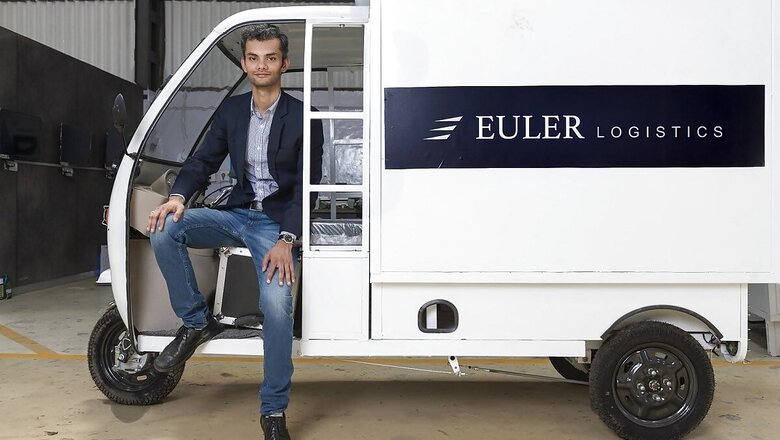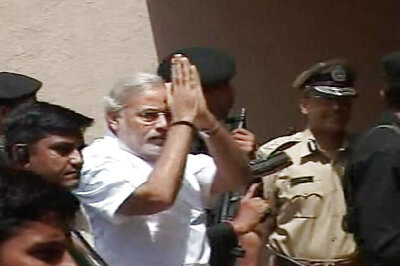
views
While electric vehicles are slowly becoming a household name in India, there’s one industry that has quickly adopted to the future of mobility before other segments who are still contemplating to bring EVs to the mainstream. E-Commerce industry, for their last mile deliveries are opting for electric three and two wheelers which not only save the operational cost in the longer run, but also helps the environment. We got in touch with Saurav Kumar, Founder and CEO, Euler Motors, a prominent player supplying electric vehicles to e-commerce players. Here’s our conversation:
Q.Tell us about Euler Motors and its business
Euler Motors was started with a single-minded focus of combating the rising pollution levels by accelerating India’s transition to sustainable mobility. Euler Motors, a full-stack OEM founded in 2018, is focused on increasing the adoption of light electric commercial vehicles for last mile delivery by offering the entire electric mobility as a service.
We want to help our customers transition to an all electric vehicle fleet for last mile logistics with our advanced-eLCV fleet, helping reduce carbon emissions and improve their eco-responsibility using our full stack ecosystem model. Our strategy has been a ground-up approach – creating a support ecosystem first with the required Infrastructure, charging stations, maintenance and service support and providing electric LCVs built for India, from India for our customers.
We will launch our three-wheeler cargo electric vehicle in Q1 2021. Our focus for the next year will be to scale up the business and ramp up the production to meet the demands in the markets in the electric three-wheeler category. We have also set up a network of 100+ charging stations in Delhi NCR for charging 200+ electric vehicles at any point. We are working to expand our charging & servicing network.
Q.What products are you offering and what is your customer base?
Ecommerce players such as BigBasket, EcomExpress and Udaan among several others have deployed Euler Motors prototype e-vehicles for their last mile delivery requirements. Boasting a range of up to 100 kilometres per charge with a 500-kilogram payload; our vehicles have been critical to enabling customers to scale their delivery capabilities in a cost-effective manner while also lowering the total cost of operations. Our vehicles have made over 10 lakh+ deliveries while reducing carbon emissions of over 22 lakh tonnes.
Q.How can EV makers support e-commerce business in reducing emissions?
Electric Vehicles in the last mile delivery within the city have become a preferred choice for many ecommerce players given the lower TCOs and operating costs for electric commercial fleets. EVs enable e-commerce companies to optimize their deliveries as they have no restrictions on operation and therefore one vehicle can optimize output by two times in comparison to an ICE vehicle during a day.
In addition, EVs can easily help reduce vehicle running cost by 1/6th in comparison to ICE vehicles and carbon tailpipe emissions by 13tonne per 100kms. Euler Motors’ vehicles have been supporting its customers relentlessly during the festive sales: for instance, our vehicles have been deployed by BigBasket for their IPL sales and we have received sizable orders to use our vehicles in the Delhi NCR region.
Q.Has Aatmanirbhar Bharat helped EV businesses in India?
Attaining self-reliance in the automotive segment is not just about manufacturing but also growing collectively along with suppliers and component manufacturers. This will be enabled by dedicated investments towards innovation and R&D, building products and services for India, in India.
Focus on import substitution, localization and self-reliance will help create a formidable ecosystem to make EVs mainstream. As one of the biggest challenges in adoption of EVs is their acquisition costs, the push towards indigenizing EV technology will help bring down the cost of ownership and increase adoption of electric vehicles.
This path to self-reliance and innovation to become an EV tech exporter will also contribute for India to become a hub for cost effective and technologically superior products.
Q.Could you share your views on the future of EV market in India?
There is no doubt that India will witness an increase in its electric fleet in the coming years, with rapid growth in commercial and two/three-wheeler segments. The government is also introducing supportive policies and initiatives to fast-forward the adoption of EVs in India.
The commercial sector especially the ecommerce and 3PL segment have realized the cost and operational benefits of electric vehicles and are transitioning to electrification. In the coming years, we expect the acquisition cost to be reduced in the three and four-wheeler EVs. Moreover, as the network infrastructure improves and we build a robust ecosystem to support electric vehicles, the heavy vehicles in the B2B category will also gain more traction. In the B2C segment, consumers are seeking affordable private vehicles which will eventually propel manufacturers to offer more cost-effective products.
Q.What do you propose for last mile connectivity solutions in India?
As doorstep deliveries have become essential today, intra-city transportation has emerged a critical tool for timely distribution and fulfilment. Vehicles catering for intracity deliveries need to be efficient, cost effective and environment friendly.
Light commercial electric vehicles are becoming the preferred choice for this segment. However, customers need powerful vehicles for seamless experience and meet the expectations of drivers and fleet owners operating within the city. Electric vehicles with higher payload capacity, better torque and battery capacity cover more deliveries and at lesser costs – EVs can make three times the trips than ICE vehicles in a single day, bringing additional value to customers.
As we build a robust infrastructure for electric vehicles and focus on bringing improved and powerful vehicles, the demand for light commercial three and four wheeler EVS will witness a rise in the intra-city logistics. In the long run, adoption of electric vehicles in the last mile delivery will contribute to much higher efficiencies and returns for customers, that too in a sustainable and ecological way.
Read all the Latest News, Breaking News and Coronavirus News here

















Comments
0 comment